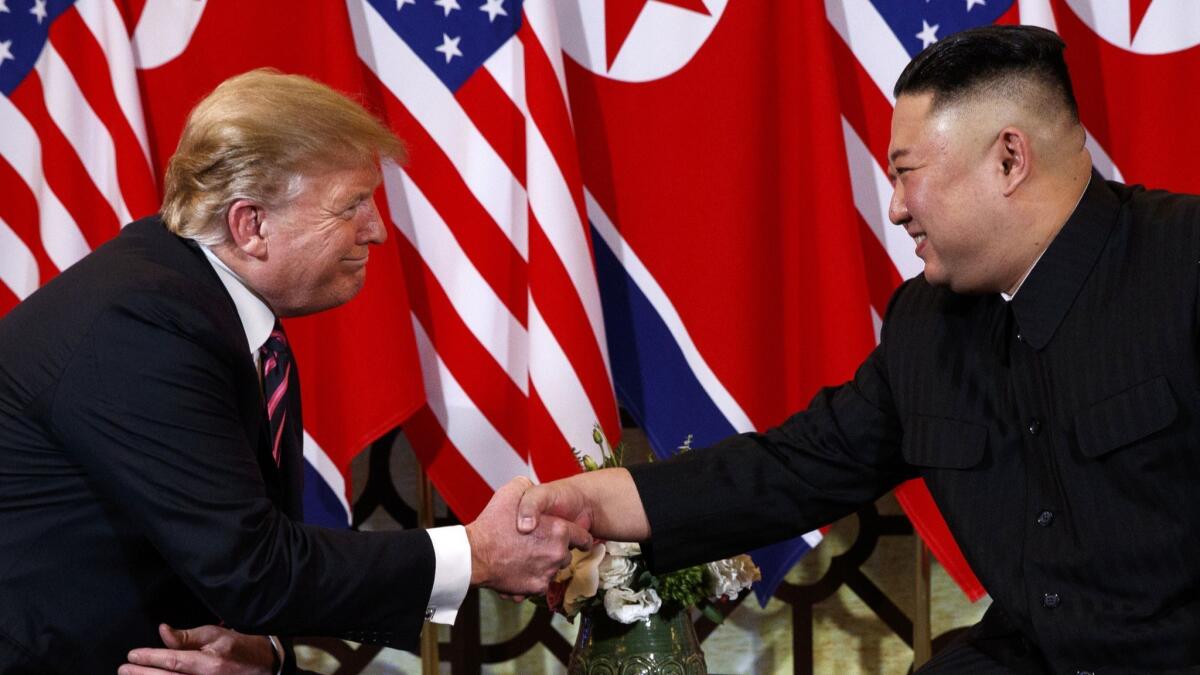Op-Ed: Trump in Hanoi was no Reagan in Reykjavik

- Share via
Give credit where it is due: President Trump walked away from a bad deal with Kim Jong Un in Hanoi. He refused to end all U.S. sanctions in exchange for the closure of a single North Korean nuclear facility.
But let’s not go overboard. His actions were not on a par, as some have suggested, with President Reagan’s decision to end arms-deal discussions with Soviet leader Mikhail S. Gorbachev at the Reykjavik summit in 1986, a move that hastened the end of the Cold War.
Even in the midst of high-stakes negotiations, Reagan regularly criticized the Soviet Union’s egregious record on human rights and its communist ideology, demonstrating a moral leadership that cut to Moscow’s core. By contrast, since opening a dialogue with Kim, Trump has avoided reference to North Korea’s oppression of its people or its totalitarian roots, giving Pyongyang’s tyranny a free pass on the world stage.
Where Reagan undermined the foundations of America’s greatest enemy in his day, Trump has risked propping up a dangerous adversary, at least rhetorically — and other adversaries will take note.
Where Reagan undermined the foundations of America’s greatest enemy in his day, Trump has risked propping up a dangerous adversary.
This administration wasn’t always silent on North Korea’s true nature. During his first year in office, Trump traveled to South Korea to address the National Assembly, where he spoke of Kim’s “tyranny, fascism and oppression.” Similarly, he used his first State of the Union to highlight the “depraved character of the North Korean regime.” He told the American people about Ji Seong-Ho, a North Korean defector who had been tortured by the authorities, and the young Otto Warmbier, an American citizen who died from his treatment in a North Korean prison.
But then the summits began and Trump’s honesty ended. Since then, he has avoided mentioning the North Korean regime’s brutality or communist dictatorship. Compare this silence to the Reagan administration’s frequent — and strident — criticism of the Soviet Union.
America’s 40th president understood that we were locked in a struggle that involved more than terrifying weapons; it was a contest between liberty and tyranny. He also knew that a nation’s authoritarianism at home was directly linked to its aggression abroad. For Reagan, the defense of freedom was therefore inextricably linked to arms control and peace.
This is why Reagan described the Soviet Union as an “evil empire” and why he went to Moscow itself to call for “freedom of thought, freedom of information, freedom of communication.” Tellingly, Reagan didn’t water down his message while negotiating with Soviet leaders. He knew he could walk away from the table without a deal because his adversary was still on the ideological defensive. North Korea feels no such pressure from Trump today.
Even worse, Trump’s silence in this moment is a gift to other authoritarian regimes. It gives Russia and China reason to suspect that the United States will walk back its criticism of their domestic oppression and international aggression so long as we need something from them. The consequences will be felt far from the Korean peninsula.
Enter the Fray: First takes on the news of the minute »
The failure of the Hanoi summit should rouse the Trump administration to renew its call for freedom and democracy in North Korea. The president must return to the language that he used this time last year. By refocusing attention on Pyongyang’s cruel ideology and oppression, he will put renewed pressure on Kim Jong Un and bring new inspiration to the cause of freedom, not just in North Korea, but across Asia and the world.
The Soviet dissident Natan Sharansky once said that when Reagan called the Soviet Union an “evil empire,” it electrified him and his fellow inmates in the Siberian gulag. “That was the moment,” he remembered, “that really marked the end for them, and the beginning for us.” Building on this sentiment, Sharansky told my organization in 2017 that freedom and human rights are “asymmetrical weapons” for which communists, and all authoritarians, have no defense.
The leader of the free world must deploy that arsenal once again. If he does, the comparison between Donald Trump and Ronald Reagan might one day be accurate — and earned.
Marion Smith is the executive director of the Victims of Communism Memorial Foundation in Washington.
More to Read
A cure for the common opinion
Get thought-provoking perspectives with our weekly newsletter.
You may occasionally receive promotional content from the Los Angeles Times.









